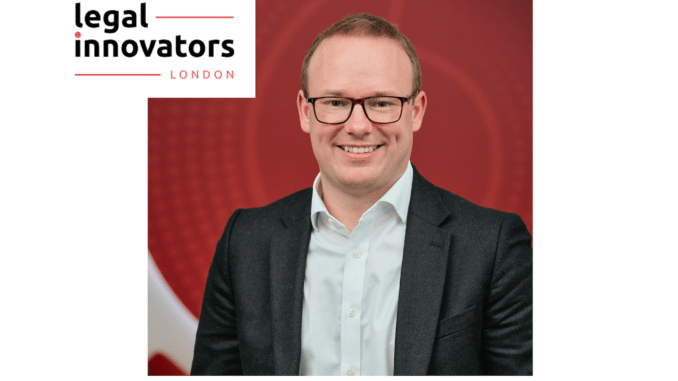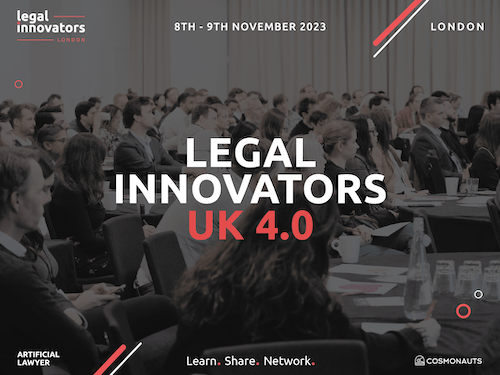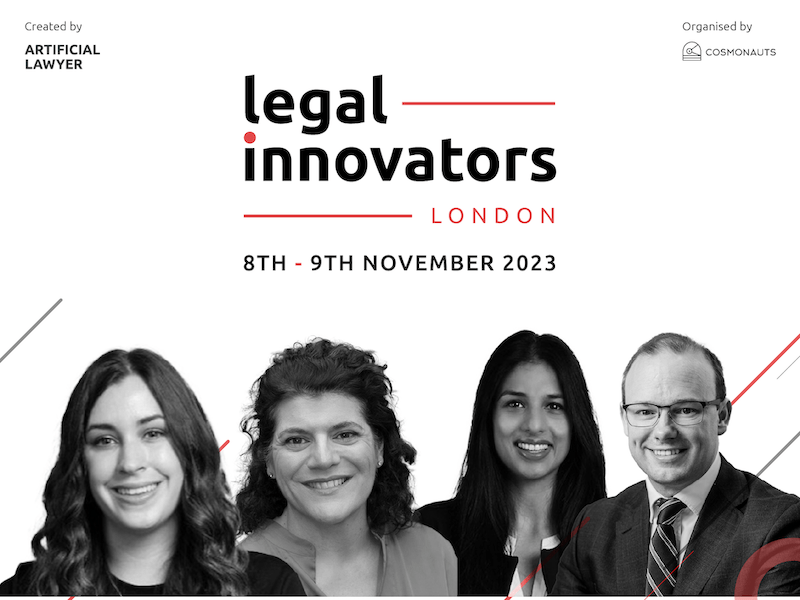
When asked how is it best to approach change management, Wayne Spillett, Head of Legal, Intellectual Property, Products & Services, at telecoms giant Vodafone, explains: ‘Set an engaging vision and then tackle it through small steps and experiments. This allows you to get your people behind a change programme and then create improvements through incremental change.’
He adds: ‘You will adapt your approach as you learn and come up with something much more cost effective and fit for purpose than would be the case if you had tried to boil the ocean or taken something expensive off the shelf on Day One.’
And this is a welcome approach as it embraces the need to be open to the unexpected, but frames the direction of travel with a unifying goal. Change management is just one topic we explored when Artificial Lawyer caught up with Wayne to find out more about his role and how he sees legal ops and the inhouse landscape evolving. Wayne is also one of the many great speakers at the Legal Innovators conference in London on November 8 + 9.
The full interview is below. Enjoy. And if you find this interesting, there will be plenty of in-depth discussions and presentations with a range of experts on legal ops and the inhouse world at Legal Innovators in November. See you there! (See link for more information and tickets.)

What is your role and how did you get into this field?
I’m Head of Legal at Vodafone Group. I sit on the Legal & Business Integrity Leadership Team and lead our Intellectual Property and Products & Services teams, covering Brand, Patents, Consumer Products and Business Products. We have a global remit and we strive to add real value to Vodafone to support our growth ambitions.
Having focused my postgraduate study on EU law in France, I started out as a competition lawyer, working in London and Paris at Hogan Lovells. I moved to the Vodafone competition law team 15 years ago and this gave me exposure to all our international markets and business lines. It was a broad legal role, covering investigations, litigation, advisory and compliance and gave me an excellent legal grounding.
Since that time I have moved around internally, learned new skills and expanded into bigger, broader roles, which is the beauty of in-house work. Over lockdown I qualified as a Company Secretary and had the pleasure of leading Vodafone Group Plc’s Corporate Secretariat function last financial year, covering a colleague’s maternity leave. So I learn something new every day, which is fantastic.
How much has your role changed in the last five years, and how much do you think it will change in the next five years?
The main changes have related to technology and organisational design. With the proliferation of new tech tools, we have experimented extensively with various digital solutions to get to grips with a changing legal world.
Having learned from these experiments, we have now selected which ‘horses to back’ as an organisation and are moving into a much more mature legal operations space, where we can really maximise efficiency by making use of digital solutions for basic tasks across the function. We are investing in more sophisticated use cases too. From an organisational perspective, in organisations as large as Vodafone we are also collaborating closely with our shared service centres, to build an international legal centre of excellence with a One Team approach across the function.
The big change to come has to be the impact of artificial intelligence. In my personal life, I have already made good use of these tools for quick tax and inheritance law questions, in order to test the water. The answers given to quite tricky issues were very accurate and I can definitely see a world where AI is the go-to for more straightforward legal questions, where an 80/20 sense check is good enough.
As a profession, working out how we best harness this technology will be critical so that it doesn’t run away from us. The trick will be to make use of it as a tool to enable us to be more efficient, focus on the strategic areas of our practice and ultimately to have more impact for our clients.
From an inhouse perspective, do you feel the balance of power is shifting more to the clients now as inhouse legal teams grow in size?
Rather than a power balance shift, what I am seeing is better partnering with panel law firms and cross-panel collaboration to support clients. As our panel set-up matures and our relationship with our panel deepens, the firms are getting better at identifying our future needs and making proactive suggestions on how they might support, for example through detailed workshops, best practice sharing sessions and training programmes.
We have also been encouraging more collaboration between our panel firms on complex matters involving various legal strands, to make best use of their respective skills and to drive efficiency. They also get together to help tackle new company and industry challenges, which is a great dynamic.
How much has improving KM and data analytics inside the business helped your legal team?
Knowledge management is inherently more difficult for inhouse functions than it is for law firms. We have found that defining a clear and simple approach to using our house technology is a cost-efficient way of approaching this. For example, across our legal teams we now have various internal hubs and a set of strong supporting materials, be they playbooks or clause banks, ensuring that our legal work is consistent and of a high standard.
Making use of platform functionality such as wiki-style tools, to enable colleagues to post tips and learning into a playbook in real time has been a great way of capturing knowledge without that feeling of gold plating. Our knowledge initiatives support learning and career progression as well, enabling people to move out of their comfort zones and try new things – even taking on new roles and promotions in entirely new areas.
Making use of data in a targeted way has been great for us as well. For example, tracking a new uptick in work in a methodical way can really support a business case for extra headcount. Similarly, tracking speed to contract execution and so ‘money in’ for the organisation has helped to secure budget for improved contract management tooling. For me as a leader, some of the most powerful data relates to people and their capacity and workflows.
A structured approach to this can really help to ensure that resource is allocated appropriately and that business expectations are managed well. The really exciting data to focus on at the end of financial year point is the data you can put to the business to demonstrate the real value added to the bottom line by the function, for example licensing revenue or damages paid in or costs clearly saved. It’s often quite insightful and supports some great conversations at leadership level within the organisation.
Do you have a view on the billable hour, and if so, what would you like to see happen?
We’ve long been clear that we aren’t fans of the billable hour at Vodafone and encourage our firms to offer alternative fee structures and demonstrable efficiencies where possible. This isn’t always easy for large, complex and unpredictable matters and so here a close working relationship between legal, procurement and the firms, is critical to ensure that costs are carefully managed.
What I would love to see is a much better use by law firms of data insights to support more accurate cost predictions, even on complex matters. We are seeing firms start to think more creatively about organisational design, use of lower cost centres and tech tools to drive efficiency, all of which is very welcome. Ultimately, it’s helpful for a legal function to demonstrate to the Executive that cost efficiencies are being carefully considered both in house and in the wider external ecosystem too. The overall picture is an important consideration to keep front of mind.
And finally, if you had one message you’d like to share about how to achieve successful change management in relation to legal innovation, what would it be?
Set an engaging vision and then tackle it through small steps and experiments. This allows you to get your people behind a change programme and then create improvements through incremental change. You will adapt your approach as you learn and come up with something much more cost effective and fit for purpose than would be the case if you had tried to boil the ocean or taken something expensive off the shelf on Day One.
Thanks, Wayne! Great insights. Looking forward to hearing you speak at Legal Innovators in November.
—
Legal Innovators Conference – November 8 + 9 – London
The Legal Innovators conference, where Wayne Spillett at Vodafone and many other great speakers are attending, will take place on 8 + 9 November. Day One: law firms and ALSPs, Day Two: inhouse and legal ops.
For tickets, please see here.
For more information, please see here.
The two-day event comes at a time of significant change for the legal market and we will be bringing you engaging panels and presentations where leading experts really dig into the issues of the day, from generative AI, to the evolution of ALSPs, to law firm innovation teams in this new era for legal tech, to how empowered legal ops groups and pioneering GCs are making a real impact.
See you there!
Richard Tromans, Founder of Artificial Lawyer and Conference Chair.
